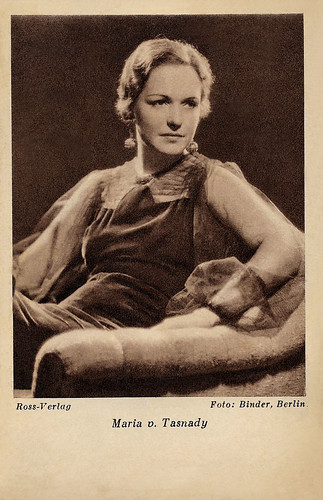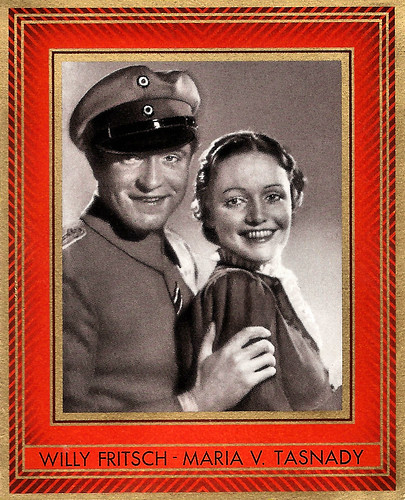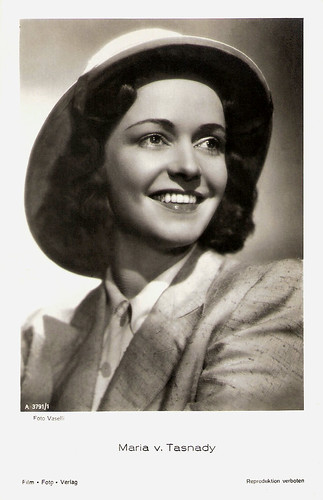
German postcard for "Das Programm von Heute", Zeitschrift für und Theater G.m.b.H., by Ross Verlag, Berlin. Photo: Binder, Berlin.

Big German card by Ross Verlag. Photo: Ufa.

Big German card by Ross Verlag. Photo: Hämmerer / Ufa. Maria von Tasnady and Willy Fritsch in Menschen ohne Vaterland/People without a fatherland (Herbert Maisch, 1937).
Moving to Weimar Germany
Maria von Tasnady was born in 1911 as Mária Tasnádi Fekete or Magdalena Fekete (sources differ) and used a variety of other professional names including Maria De Tasnady, and Mária Tasnádi during her career.
Von Tasnady was born to ethnically Hungarian parents in Transylvania, then still part of the Austro-Hungarian Empire. Following its transfer to Romania after the First World War, she emigrated to Hungary.
She was the Hungarian entrant at the 1931 Miss Europe pageant, losing out to the French winner Jeanne Julia. She studied literary history and German at the University of Budapest and wanted to become a journalist.
Moving to Weimar Germany, she made her film debut in 1932 in Durchlaucht amusiert sich (Conrad Wiene, 1932) with Georg Alexander and Lien Deijers, and Wenn Die Liebe Mode macht/When Love Sets the Fashion (Franz Wenzler, 1932), starring Renate Müller and again, Georg Alexander.
Maria von Tasnady had the lead in several German films including Schlussakkord/Final Accord (Detlef Sierck, 1936). It was the first melodrama directed by Detlef Sierck, who later had a career in Hollywood as Douglas Sirk and specialised in melodramas. It was made under contract for Universum Film AG (UFA), stars Lil Dagover, and Willy Birgel. It shows stylistic features later developed by Sierck/Sirk and makes symbolic and thematic use of music.
She also appeared in the drama Die Frau ohne Vergangenheit/Woman Without a Past (Nunzio Malasomma, 1939) starring Sybille Schmitz and Albrecht Schoenhals.

French postcard for the Miss Europe 1931 pageant. A.N., Paris. Photo St. Mano. Hungary's representative was Maria Tasnady-Fekete.

German collectors card in the Bunte Filmbilder series by Greiling-Zigaretten / Ross Verlag, Series II, no. 288. Photo: Ufa. Willy Fritsch and Maria von Tasnady in Menschen ohne Vaterland/Men Without a Fatherland (Herbert Maisch, 1937).

German collectors card by Ross Verlag. Photo: Ufa.
Radio Free Europe
Maria von Tasnady appeared in her native Hungary in the historical film Sarajevo (Ákos Ráthonyi, 1940) starring Von Tasnady, Ferenc Kiss, and József Timár. The film is set against the backdrop of events leading up to the assassination of Archduke Franz Ferdinand of Austria in 1914.
She returned to Germany for crime film Alarm (Herbert B. Fredersdorf, 1941), also starring Karl Martell and Paul Klinger. The production was made by the independent Aco-Film rather than one of Germany's major film companies. It was shot at the Althoff Studios and various locations around Berlin including Tempelhof Airport and the Karstadt Department Store.
In Italy, she then appeared e.g. in the patriotic war film Bengasi (Augusto Genina, 1942) with Fosco Giachetti. The film was a propaganda work, designed to support the Fascist regime of Benito Mussolini.
Bengasi is set in 1941 during the Second World War when the city of Benghazi in Italian-ruled Libya was occupied by British forces. It portrays Allied atrocities, such as the murder of a peasant by a group of drunken Australian soldiers. Bengasi was presented at the Venice Film Festival and won the Mussolini Cup as the best Italian film while Fosco Giachetti won the best actor award. It proved popular with audiences and was re-released in 1955 with some new scenes added.
She reunited with Giachetti for the Italian drama Inferno giallo/Yellow Hell (Géza von Radványi, 1942) also starring Pál Jávor. A Doctor working in the tropics falls in love with another man's wife but is killed in a native uprising before he can confess his feelings to her.
Following the Second World War, she was employed by Radio Free Europe. She still did three films, playing e.g. Enrico Caruso's mother in Enrico Caruso - Leggenda di una voce/The Young Caruso (Giacomo Gentilomo 1951) with Ermanno Randi in the title role and also with Gina Lollobrigida. The film follows the life of the legendary tenor from childhood poverty in Naples to the beginning of his rise to fame.
She stopped film acting in the late 1950s. One of her last films was the drama André und Ursula/Andre and Ursula (Werner Jacobs, 1955) starring Ivan Desny, Elisabeth Müller, and Ina Peters. It was based on the 1937 novel of the same title by Polly Maria Höfler. The film updates the book's storyline from the First to the Second World War.
Maria von Tasnady passed away in 2001. All in all, she appeared in twenty-five films during her career. Von Tasnady was married to the film producer Bruno Duday.

German postcard by Ross Verlag, no. A 3340/1, 1941-1944. Photo: Inkey Felvétele.

German postcard by Film-Foto-Verlag, no. A 3791/1, 1941-1944. Photo: Vaselli.

Big German card by Ross Verlag. Photo: Ufa / Hämmerer.
Sources: Wikipedia (English and German) and IMDb.
No comments:
Post a Comment